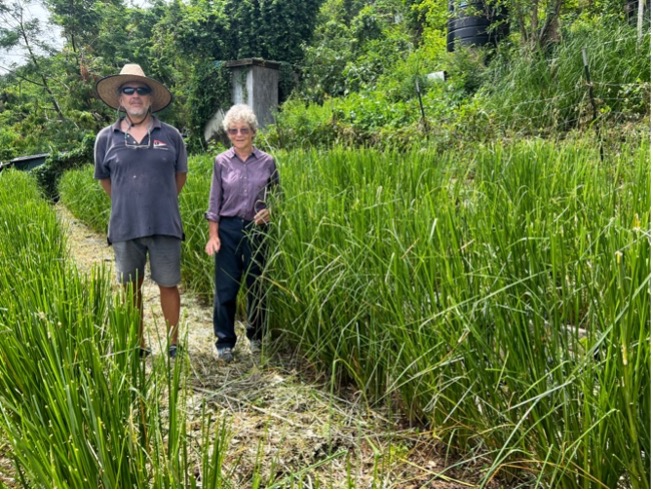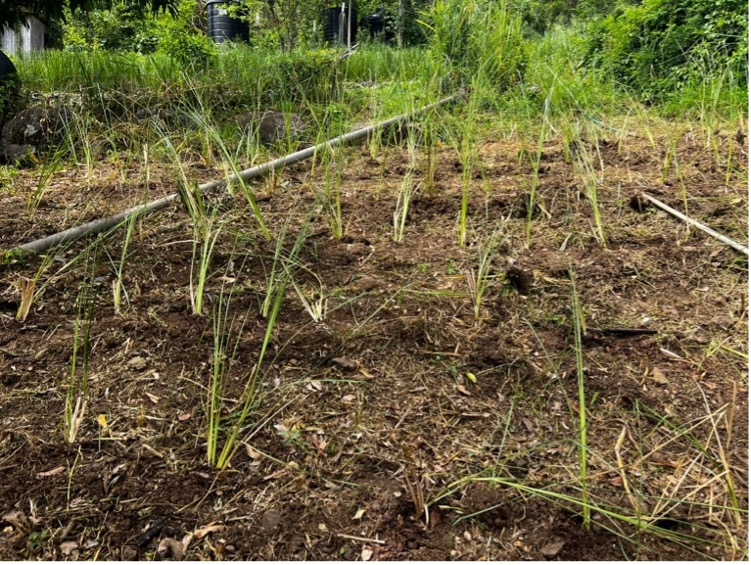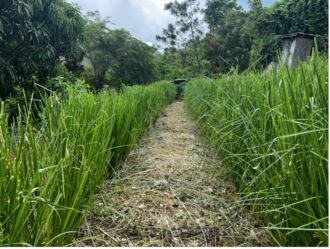ST. THOMAS, Virgin Islands – Laura Martin focuses her Southern SARE Education Grant (EDS24-069) project on the benefits of using vetiver grass for soil conservation and erosion control. She explained that vetiver's deep, dense roots help stabilize soil, prevent landslides, and increase water infiltration. The grass forms a protective barrier that stops sediment and slows water flow, allowing moisture to be retained in the soil. It can be used on hillsides to prevent erosion and on flat land to mitigate flooding from heavy rainfall events. Vetiver also protects crops and road edges from water damage. Overall, the vetiver system addresses challenges like drought, soil degradation, and extreme weather faced by farmers in the Virgin Islands.
While studying medicine in Philadelphia, Laura Martin explained her journey from being a small older farmer on St. Thomas, Virgin Islands of the United States, who found a farm that had not been farmed for decades and is using it for production and education. She shared how she learned about the SARE program and her initial involvement in farming, which was sparked by another farmer on St. Thomas.

Southern SARE Communications Specialist DaraMonifah Cooper visited Laura and her son Sam Martin on their farmland. During the tour, she learned about the farm's history, the project’s progress, and their aspirations for the future, particularly in water remediation, sustainable agriculture, and soil conservation using vetiver grass.
Martin shared the challenges of managing a degraded property affected by soil erosion and flooding. She discovered vetiver grass was an effective solution, significantly reducing erosion and managing stormwater runoff. However, she observed that many farmers were not utilizing this method, prompting her to deepen her understanding of soil degradation and farming practices worldwide. Her research revealed several barriers to improving soil health, including accessibility issues and difficulties with composting. She applied for a Southern SARE Education Grant to enhance her knowledge on the topic and promote the use of vetiver among farmers. Her focus included water remediation efforts and collaborating with a neighbor to address nitrogen and phosphorus contamination in a nearby pond.

Martin's presentations and workshops, held across the three Virgin Islands, aim to educate farmers and the local community about using vetiver grass to prevent soil erosion. She noted that the workshops have been successful, with participants expressing keen interest and beginning to propagate the grass. When asked about further plans to enhance the project, she suggested expanding efforts to other islands and collaborating with government entities such as the Department of Agriculture, Planning and Natural Resources, and Coastal Zone Management.
Partners of this project included the University of the Virgin Islands School of Agriculture Cooperative Extension Service, the Virgin Islands Department of Agriculture, USDA/Natural Resources Conservation Service, the We Grow Food, Inc. local farmer organization, Paradise Farm, and her neighbor, Mr. Burton. For more information on the EDS24-069 project, visit https://projects.sare.org/sare_project/eds24-069/.
